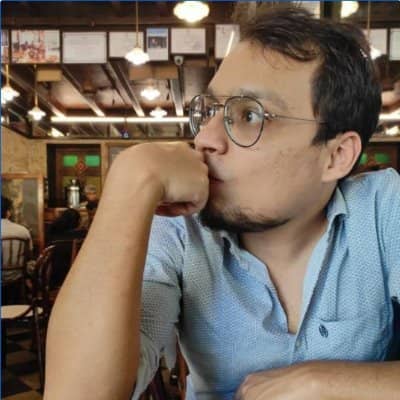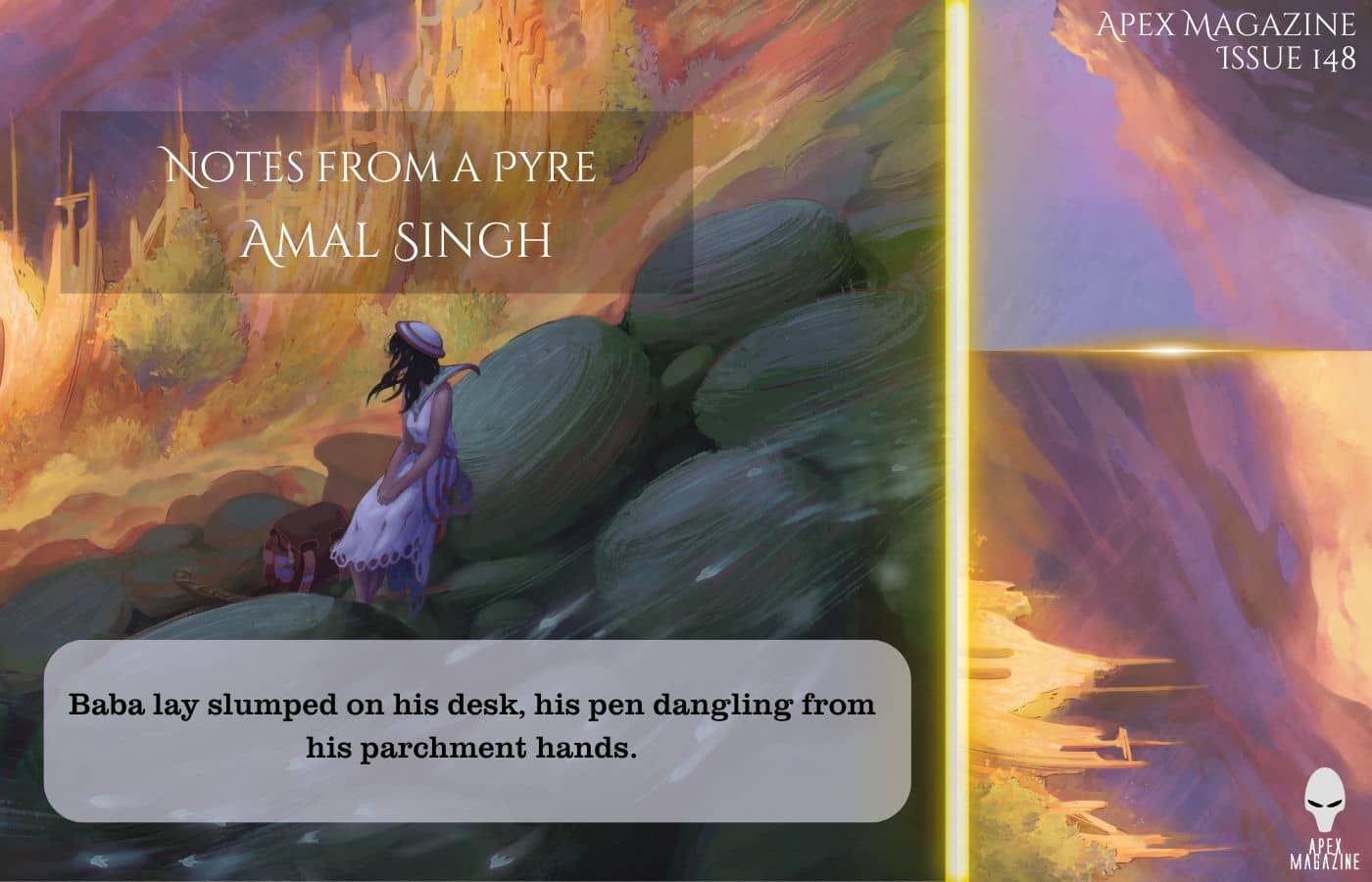
You left home to become a Ringmaster in the Island Circus.
The rain had stopped. You looked outside the window and saw puddles. You’d skim the oily rainbow sheen off the puddles and apply it on your skin if it were up to you. Fifteen oar-strokes ahead, Mr. Shindey sat on his porch, stroking his cat, sipping his morning kadha. He waved to you. You waved back. The cat yawned, and I stifled a smile.
But then, the sidewalk slid, taking mulch and stone with it, and the puddle became one with the water around our house. Barely afloat, our house thrummed with the possibility of sinking. You shook, I shook. Mr. Shindey almost stood, surprising his cat. He wanted to help. Your eyes peeled, briefly, then became slits. I couldn’t tell if you were practicing clownery, or you were genuinely terrified. For a moment, I thought we would drown. But it often looked like that when the rains came.
Beneath the foundation of our home, the Floatation connected our soc apartments. Mr. Shindey was fifteen oar-strokes away, Mrs. Shukla was a boat ride past. You’d taken my tuggy to Mr. Shindey's apartment to get milk when ours inevitably expired into curd. You returned with some extra sugar when the rains came.
My chai sloshed on my saucer. Our apartment groaned and bobbled. I waved to Mr. Shukla, gesturing to him to keep sitting. His cat looked like it would jump in the water. He reined it in. You would throw treats to the cat, on better days. One time, you tossed a mackerel. One time, a couple of shrimps. He’d grab some, while the others plopped into the water, inevitably, as all things did. He didn’t go on chasing them. He knew better.
You were quiet that day. You were thinking of clownery. You were thinking of the sanctuary for misfits you were going to be a part of. I was thinking of going down into our basement and checking on the motors of our Floatation. You didn’t see what happened to the Mishras when their Floatation stopped working. You were too busy watching yourself in the mirror, applying white paint on your face and a red ball over your nose. You never went downstairs where the foundation of our home is ensconced inside the Floatation, kept alive, barely. The cement would inevitably erode, revealing the rebars, which would rust. The Floatation slowed that process and kept us afloat.
But you had dreams of the Island Circus. You wanted solid ground, while civilization swam upon an ocean that had no end in sight.
Later, you never expressed interest in knowing what happened to the Mishras. You hated Sourabh, anyway. He once stole your eyeliner and used it for purposes other than makeup. Your rage at Shikha was incendiary when she called your artwork “juvenile.” I blame you. Why would you show someone your art who couldn’t tell the difference between a Monet painting and a shit smear on a sidewalk?
When the hateful couple’s Floatation stopped working, our soc decided to sever our ropes with their apartment. You never heard Shikha’s screams as the waves took their home. The crows told me it was still somewhere out there, bobbing away. Shikha now has enough time to appreciate correct art. Sourabh has learned his lesson. They might find another soc like ours. More forgiving.
I’m telling you this because you ought to know.
I always loved you. You ought to know this, too. Even when Maa lashed at you when you first applied makeup. I thought you looked beautiful. You were transforming yourself, and I liked that. Papa’s restrained indifference was what bothered me, always. At least Maa had words. Papa only had gestures. A slight curve of his lips, a burrowing of frows, hard lines on a face that looked like a decaying block of cement on the worst of days.
I saved you from the worst of them. When you took my tuggy and disappeared for three days only to return with a fresh catch of salmon, I was the one who told Maa that you were gone for … hell, I don’t even remember what excuse I gave for you. In the end, I’d lost count.
The salmon curry was good. Papa cleaned the plate, but Maa refused to eat. Maybe that was Papa’s gesture of acceptance. Maybe that was Maa’s final rejection of you.
That day, at the end of monsoon showers, when our roof was a pool, and the harvester had stopped working, and we had to gather water in buckets and bring it downstairs to boil to make it drinkable, you were indifferent and dancing on the roof to the tune of “Barso Re Megha.” The soc watched you. Mr. Shukla snickered. Mr. Shindey clapped. Others, farther than our apartment, yet still connected by ropes and walkways, were mocking you.
It was the mocking that Maa and Papa couldn’t stomach.
It took me a while to explain to Maa and Papa that you were not irresponsible. You were just you.
No one liked the idea of the Island Circus. But I don’t have to tell you that. You already know, and you still went.
They said the Island Circus was not a real thing. They said it was collectively dreamed by people who didn’t want to spend half of their eternity in moldy basements, checking screws and levers and oils and valves. The jade green glow of the Floatation, its sixty-four cycles pedaled relentlessly underwater, its gauges, its meters, all to be checked bi-weekly by one family member keeping vigil. It had to be like clockwork, lest we meet the fate of the Mishras.
I felt bad for Mr. Shindey, who lived alone. His cat couldn’t check the Floatation, of course. So, I’d helped him devise a system. The nights you went to check on the Floatation, I’d be at Mr. Shindey’s house checking his. It was quite the routine, so he could play with his cat while I was in the basement.
During my third visit, you started screaming.
At first, I couldn’t hear anything. Mr. Shindey’s basement was clogged with the smell of dead fish, and I could feel the pressure of the ocean around me, its incessant drumming against the weak walls of the house. My damp hands were clutching the lever that I had to pull twice to make sure the Floatation had enough fuel to keep running another fortnight. My insides were clotted with must as I tried to remember the correct reading. I hoped you were trying to do the same.
Instead, you were screaming.
I pulled the lever and saw the reading. The fuel wasn’t enough. By my calculation, Mr. Shindey’s Floatation would stop in two days. I called the old man, but my voice cracked like marble scuttling over jagged wood. I tried again. He didn’t respond, but his cat did.
I climbed upstairs to his bedroom. His cat stood near the doorway that led out into the living room. From my vantage point, the porch was visible. The waves raked the wood, licking it, eating it, and the ocean looked like a groaning beast, ever-evolving. Where I stood, I saw Mr. Shindey jump out of his tuggy and climb our porch.
I picked up the cat. I came out of the house. I called out to the old man.
He turned around.
“He’s yelling,” he said, standing uncertainly on our porch. I was cradling his cat. It felt like our roles had reversed. “I heard your brother yelling.”
“You could have called me,” I said.
“I thought he was dying, so I rushed.”
Then he went inside. So I waited again. I was afraid of moving. Each creak of wood beneath my feet signaled danger. Water had seeped between the gaps in the wood, partially flooding Mr. Shindey’s porch. Low fuel in the Floatation often did that.
When he finally appeared from the depths of our home, you were hanging by his shoulders, pale as death, and soaked to your skin.
You made puddles of your own on our porch. You were dripping, pools of starlight.
Caring for you that day, I was late to pick up fuel for both of our homes. I made fish soup for you, which you slurped with a lot of sound. When I was leaving to get fuel, you told me the Floatation had spoken to you. You told me it did not want you down there. You told me it wanted me, only me. I had believed you, then.
Later, when you went beaming to the Island Circus, leaving all of us behind, I realized you had lied. You just didn’t want anything to do with the Floatation. You didn’t want to live with me, with us in the community. So you had concocted a lie. You’d gone too far, that day. In your lie, you had sabotaged our Floatation while I was trying to fix Mr. Shindey’s basement. You didn’t think, for a second, you were responsible for three lives.
But I had stopped expecting rationale from you long ago. You were just you.
When we broke away from the land, you were just five. You never saw what Papa, Maa, and I had to go through to keep us afloat in our socs. Granted, our Floatations were pre-arranged by Chirag Mama, who had made a lot of money, once upon a time. But you never saw what our interconnected homes first looked like, fresh in the waters of the Arabian Sea, as the land we once called home became a memory of soil.
It takes a community to live deep in the sea. We saw six Drownings, and when they became too much for a soc to handle, we decided on Severing, like the ones the couple had to endure. But you would never know. After you turned ten, you never really cared. You had only known the sea, but you still dreamed of an island.
We were content. You were not.
You saw them when you and I were on our fueling trip to the Big Soc. The waters were calm that day. Ripples of sunlight around us, in patches. A gallop of fish, intermittent. A smile had ripped across your face, tearing apart your anguish. I felt hopeful.
Then, your gaze drifted.
Two men and three women, dressed in pink and blue and yellow, wearing hats, dancing on a big boat. Their faces were painted, too. Sharp ink strokes, flair of red, splotches of jade. They played with the beasts that they had domesticated.
“Who are they?” you’d asked me, your eyes brimming with wonder. I thought nothing of that group. So, I lied to you.
“Socless, good-for-nothings,” I said. I was protective of you. You must understand this.
The Big Soc, an interconnected medley of fifty socs, loomed ahead of us. A golden spire jutting out of the depths of the ocean and fifty gleaming pathways that led to their respective socs. The pathways were adrift with people, just like us, going about their days. Some fished, their legs dangling, toes touching the ocean, while some were casual observers. Some drank in the middle of the day. Some were running, joking, laughing, just being. Their faces weren’t marred by the worry of sustenance. That’s what the Big Soc was all about. We’d dreamed of Big Soc. I looked at it in awe.
But your eyes were elsewhere. You were waving at the soc-less on the boat, with their animals. They were waving back. I could see their fingers twisting towards you, beckoning you.
“Shyamak, look, the Big-Soc! How majestic!” I tried in vain to divert your attention. But you were already too far gone.
When we returned, you went to your room. At night, you came out with your face painted like the soc-less. That was when Maa yelled at you. That was the first time I protected you.
We saw more and more like them every week. The outcasts, the singers, the dancers who were not bound by soc and Floatations. They had their boats, they had their animals. And they had a mission.
Three weeks after you first saw them, you told me you wanted to meet them. You had a name on your tongue. A name you’d grown fond of. Rytasha. The one who ferried foxes. The one with brimstone hair and midnight eyes.
I told Maa you were going to catch salmon.
During cold, rainless nights of the sea when we were huddled under blankets, you told me stories about them. I listened with both attention and indifference, lies coiling inside my mind, lies I’d have to tell on your behalf.
I lied to Maa and Papa that Rytasha was my friend. That her eccentric way of dressing was in no way meant to influence you, instead, it was for a research project I was a part of. Cultures and Fabrics of Pre-soc Days. Even I snickered at the names I concocted. Maa and Papa won’t go to the lengths of taking our tuggy to my school to confirm.
I accompanied you so you could spend your evenings with her, doing whatever you were doing, applying paints on each other’s bodies, singing, dancing, while I was on my boat, rowing around you in endless circles, like a planet around the sun, waiting for you to be done.
That night, you expressed your desire to move away. You didn’t have to say it. The twinkle in your eyes after spending time with Rytasha told me as much.
Ringmaster. I remember Ringmasters as gruff men holding sharp leashes to keep animals under control. That was not what you were to be. Ringmaster was a synonym for the leader of new recruits. Your words were your whip. The animals were people.
There were animals, too. But they were to be cared for, not put up for spectacle, pleasing the whims of a frenzied audience. The island is a sanctuary for the misfits.
That much, you told me. I never cared to find out the rest.
The rest of it I heard from whispers on the wind. Mrs. Shukla knew someone who knew someone whose cousin went to the Island to be a Needs Coordinator. Far ahead, in another soc, someone else left to be a Waterboy, whatever that meant. As I said, trickles came to me, and in the long hours after midnight when rains pattered at my window and the Floatation groaned deep beneath the spot where I slept, I dreamed of the Island too.
You could have left a letter. Or a general manual outlining directions. I am good with a compass, and even if our soc floated to the East during storms, I would have managed to find the island.
I figure I would do well as a Quietness Attendant. I made that role up. But maybe if you introduce me to your peers, I could come in handy. A Quietness Attendant would soothe people in times of their anguish. Iron off the creases of worry from their foreheads. Just like I’ve done twenty years of my life with you.
I would paint my face, too. I am sorry for calling what you did “clownery.”
It has been two months since you left for the Island Circus. Mr. Shindey comes over often. We share watery chai and soggy biscuits. Did I ever tell you there’s nothing worse than watery chai?
Mr. Shindey appreciates my hollow efforts at building camaraderie. But his eyes tell me he misses your presence. Because you were so good with his cat. I am sure the cat misses your mackerels too. I hope the Island Circus has cats, both big and small.
I have taught Mr. Shindey how to check the Floatation. The fueling responsibility remains with me. Every two weeks, I pedal alone to the Big Soc. Two miles away from the Big Soc, I often hope to see a boat full of people, dressed in colorful clothing, clapping away to another place. A place that wasn’t the Big Soc. But all I see are the quietly lapping waves and seagulls plucking mackerels off the water sheen.
I blamed you first, but I don’t blame you now. During nights, the walls of our home crawl over me like wet vines and eat me. During the day, I sit outside on the porch as our soc wobbles away towards an uncertain destination. I wave my good mornings to Mr. Shindey, Mrs. Shukla, and the faraway members of our soc. All drifting, connected by frail ropes and withering walkways.
It happened in the morning. Mr. Shindey’s chair sagged and crumbled under his slumped, heavy post-death frame. His heart just stopped beating. His cat sniffed him, then mewled in anguish.
I did the rites, however I could manage. Like I did with Maa and Papa.
In the end, I sent off Mr. Shindey in your tuggy. Then, I went to work.
First, I chopped off a salmon and fed it to the cat. Then, I went down to Mr. Shindey’s basement and switched his Floatation off.
I picked the cat up and went to our house. The cat sat quietly on the spot you often sat, an aged musty couch that smelled of you.
I packed my belongings. Everything I owned is now snug inside a duffel bag. In the end, you’d be surprised how little we need to survive. But I guess you already knew that. I guess that’s why you left. You were tired of the excess of it all.
I was tired too.
After packing, I went to our basement, took a long, lingering look at the Floatation. The smell of reeds and scales and swollen things was unbearable. If the smell was a color, it would be green bordering on the black. I inhaled, held my breath, and switched the Floatation off. The house shuddered as I climbed back up.
I grabbed the cat, my duffel bag, and jumped on my tuggy. Then, I pedaled away. The soc would find two empty houses with dead Floatations the next morning. I could have severed our houses myself, but I am so, so tired. The soc will do what they need to do.
I am coming to you, Shyamak. I’ll find you, even if it takes me weeks. Even if I have to seek out other socs and live with them, temporarily. I’ll tell them I’m soc-less. They’ll be kind. Then, I’ll leave.
I forgave you long ago. But I’m coming for your forgiveness, too. I’m drifting towards you. I am going to be a Quietness Attendant in the Island Circus. And you better wait for me where the waters kiss the sand.











